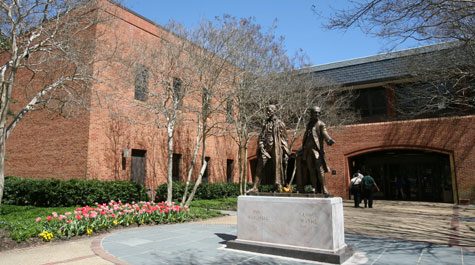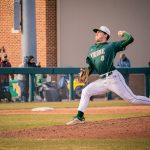Thursday, Oct. 27, The College of William and Mary Law School held an interactive panel discussion titled “Reproductive Justice: Rights and Realities Post-Dobbs.”
The law school’s Center for Racial and Social Justice, the College’s Gender, Sexuality, and Women’s Studies Department, the Black Law Students Association, the National Lawyers Guild and If/When/How organized the event.
Panelists included law school professor Dr. Vivian Hamilton, Hampton Roads Reproductive Justice League representative Ammie Pascua, American Civil Liberties Union of Virginia representative Breanna Diaz and Blue Ridge Abortion Fund’s co-director of Movement Building and Engagement Stephanie Nash. The panel was introduced by second year law student Kyle Hyde J.D. ’24 and moderated by second year law students Ella Ginsberg J.D. ’24 and Kendall Piertzak J.D. ’24.
Hamilton kicked off the panel by giving a brief overview of Dobbs v. Jackson Women’s Health Organization, the court case that overturned Roe v. Wade on June 24, 2022. She also explained the subsequent fallout of the overturn by highlighting a map of updated statewide abortion access. Diaz followed by explaining abortion parameters and laws in Virginia.
“We do not have the right to an abortion in Virginia. I think that needs to be really clear when we talk about abortion access is in Virginia. we do not have a right statutorily: constitutionally, a right to abortion. What we do have is a set of laws that exist in our criminal code that define the parameters for abortion access.”
“We do not have the right to an abortion in Virginia,” Diaz said. “I think that needs to be really clear when we talk about what abortion access is in Virginia. We do not have a right statutorily: constitutionally, a right to abortion. What we do have is a set of laws that exist in our criminal code that define the parameters for abortion access.”
Diaz discussed what abortion access looks like in Virginia, including narrowed access based on the timeline of pregnancies, access to abortion pills and parameters for underage abortions. They also mentioned that it is not required to be a resident of Virginia in order to receive abortion services within the state. Nash and Pascua followed by explaining the role of abortion funds nationwide as well as within Virginia.
“At the core principle of any abortion fund is that we fund abortions,” Nash said. “But what we’ve seen, more so since June 24th, is folks also calling needing practical support.”
Nash also emphasized the importance of reproductive justice frameworks that highlight the intersections between reproductive rights and other social justice and human rights issues. Nash mentioned that Blue Ridge Abortion Fund is currently working on an ambassador program to train individuals in cultural competency and create a sustainable community to support those seeking abortion care.
“We take care of each other from a grassroots perspective,” Nash said. “We partner with other funds and collab with other organizations, supporting and uplifting the work be that legislation, be that cookouts, be that collab requests and trying to fill in gaps.”
Pascua followed by discussing their work with the HRRJL, mentioning various gaps they saw missing in the community after they sought abortion care in 2019. HRRJL, created in 2021, is intended to remove financial and logistical barriers to reproductive healthcare and abortion access, according to their website. This page also mentions that they believe funding abortion to be “an act of radical care.”
“There are abortion clinics here, but there are many barriers, finances being one, stigma being a huge one. so we saw a need here that people needed funding for abortions, they were needing funding from other parts of the state. in the concept of solidarity and mutual aid, we decided that we needed to build something in hampton roads.”
“There are abortion clinics here, but there are many barriers, finances being one, stigma being a huge one,” Pascua said. “So we saw a need here that people needed funding for abortions, they were needing funding from other parts of the state. In the concept of solidarity and mutual aid, we decided that we needed to build something in Hampton Roads.”
After initial questions from the moderators, the floor was opened to questions from the audience, with topics ranging from increased pressure on abortion rights activists to the criminalization of abortion to gender inclusivity.
Nash and Pascua highlighted the difficulties their funds have experienced post-Dobbs, including emphasis on burnout and the influx of calls. Pascua mentioned that HRRJL is completely volunteer-run, and is currently the smallest abortion fund in Virginia.
“Abortion funds existed prior to June 24th, and so the stretch has always been thin,” Nash said. “Blue Ridge is fortunate to have staff, we are a staff of six and counting. This work is just draining in general.”
Nash also emphasized the role reproductive and abortion care employees play outside of just funding, including providing transportation and emotional care, along with navigating various needs such as childcare. She again emphasized the importance of a grassroots community in which individuals are able to engage each other and lean on one another for support.
In terms of ACLU, Diaz mentioned her work to fund abortion, remove barriers and find new ways to codify the right to abortion in legislation or amendments. They also mentioned preparation for a difficult general assembly session in January, with an onslaught of anti-abortion bills already being introduced by Gov. Glenn Youngkin.
“Going into a post-Dobbs world, it truly is now up to the legislature whether we have access to abortion,” Diaz said. “What I’m trying to do is work with legislators in the community to say ‘you will oppose any ban that reaches your desk or your committee,’ mobilizing our base, trying to reach out to folks and let them know that you still have some sort of access to abortion, but we can lose that in one session.”
Hamilton went on to explain efforts to codify Roe v. Wade federally in addition to efforts from state legislatures to constitutionalize or codify abortion. One student also asked about threats to other federal rights based on the Dobbs decision.
“The short answer is yes, we should be worried,” Hamilton said. “Alito was trying to reassure that no, this decision doesn’t implicate these other rights. Justice Thomas made no such effort, and in his concurring opinion he wrote ‘in future cases we should reconsider all of this court’s substantively processed precedents.’”
Hamilton emphasized that there is now a whole range of rights that are now threatened by the Dobbs decision, including the right to same-sex marriage and the right to contraception. She believed it not to be outside the realm of possibility that these cases may eventually be reconsidered.
There was also many concerns from the audience about what people can do to protect the right to abortion and take tangible action. Nash emphasized the importance of voting and educating those close to you while Pascua mentioned the importance of educating oneself on the reproductive justice framework and changing language.
“Start with your language. Stop saying you’re pro-choice, because not everyone in our country has the same choices. the only people that are pro-choice that always have choice are rich, white people that can travel wherever they need to get access.”
“Start with your language,” Pascua said. “Stop saying you’re pro-choice, because not everyone in our country has the same choices. The only people that are pro-choice that always have choice are rich, white people that can travel wherever they need to get access.”
Diaz reminded the audience that people in many communities across the United States have found ways around abortion restrictions before the overturn of Roe v. Wade, and that communities will continue to do so.
“Regardless of what the laws tell us, we will always take care of ourselves and our community,” Diaz said. “We’ll find ways around it. It’s going to be unfortunate to have to go back to that situation if it occurs as it has occurred in several states, but, you know, abortions will still happen.”
Nash then discussed the importance of young people in presenting the world with new ideas as well as the significance of focusing on what communities can do now rather than fears about a post-Dobbs future in which abortion becomes criminalized. Diaz then mentioned that with the overturn of Roe v. Wade, people now have the opportunity to reframe abortion access in different ways. Pascua also spoke to the importance of saying the word “abortion” in everyday language in order to destigmatize the conversation.
The last topic covered was the emphasis on gender inclusivity within the abortion conversation, with both Diaz and Pascua speaking to the experience of being nonbinary individuals within the realm of reproductive care and abortion conversations. Both Diaz and Pascua urged the audience to speak about abortion as a non-gendered issue.
Professor Diya Bose concluded the panel by thanking the guests for offering advice and suggestions for future action.
“Thank you for reminding us that reproductive justice has always been an urgent issue,” Bose said. “It was before Roe fell and it is right now. And that self-determination has always been a collective project. Reproductive freedom is meaningless if you have to pay for it, if it depends on where you live, your zip code, if it depends on what immigration documents you have. So none of us is free if any one of us is not free.”




































